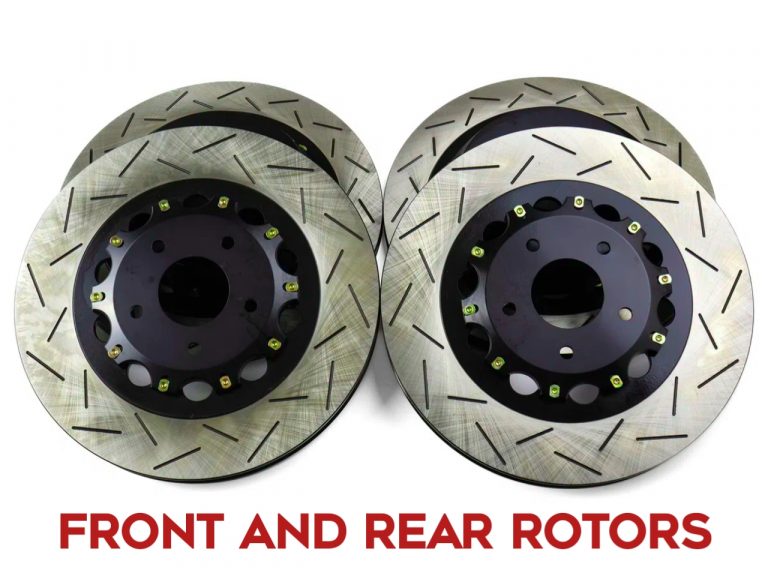It is essential to know that front and rear rotors are different. Many drivers assume that they are, but this is not true.
If you are one of those drivers unaware of the differences between front and rear rotors, you need to continue reading. In this article, you will learn all the essential information about both types of rotors.
Front rotors are larger, thicker, and more expensive than rear rotors. This is because they endure more wear and tear than the rear rotors. It is essential to remember this when it comes to replacing your brakes.
What Are Car Rotors?
Your car’s braking system is vital for your safety on the road, and the car rotor is an essential part of it. It is located behind each wheel, a metal disc that works with the brake pads to slow down the wheels when you apply the brakes.
Over time, car rotors can wear out due to regular use and exposure to different elements. That’s why it is crucial to inspect them regularly and replace them when necessary to ensure your car’s braking system is functioning correctly.
Worn-out rotors can cause your brakes to produce squeaking or grinding noises, reduce your braking power, and increase your stopping distances, leading to dangerous driving conditions.
If you experience any of these issues while driving, it’s best to consult a qualified mechanic to check your car rotors. They can tell you whether you need to replace them or not to ensure your safety on the road.
How Do Rotors Work?
Car brakes are designed to use friction to slow down the rotation of your wheels. So your car brake pads create friction and press against a spinning metal disc (or rotor) to slow it down.
This process works because of two laws of physics:
- The law of conservation of energy means energy cannot be created or destroyed, only transformed from one form to another.
- And the law of friction means that when two surfaces rub together, they create heat and resistance.
Immediately, you step on the brake pedal, and hydraulic fluid will be sent from the master cylinder to the calipers. Directly the calipers will squeeze the brake pads against the rotors, creating friction. This friction produces heat that, in turn, slows down the rotation of your wheels.
The amount of force needed to stop your car depends on several factors, including:
- The speed at which you’re traveling
- The weight of your vehicle
- The condition of your brakes and rotors
- The terrain you’re on
If any of these factors change, the force required to stop will be changed. That’s why you need to regularly check your brakes and rotors so that you will be able to replace them when necessary.
How to Tell If My Car Needs New Rotors?
There are some signs that your car may need new rotors, including:
- Squeaking or grinding noises when you brake
- Reduced braking power
- Longer stopping distances
Whenever you notice these issues, it’s time to take your car to a qualified mechanic to check the rotors. They’ll be able to tell you if they need to be replaced or to give them a new surface.
Are Front And Rear Rotors the Same?
Although they may look similar, they are designed to perform distinct tasks and are not interchangeable.
Front rotors are typically larger and thicker than rear rotors, as they provide most of the braking power in your car. The rear rotors, on the other hand, are designed to balance out the braking and provide stability.
Since the front and rear rotors perform different tasks, they experience different levels of wear and tear and require different replacement intervals.
How Much Do Car Rotors Cost?
Currently, the cost of replacing your car’s rotors depends on the make and model of your vehicle. You need to pay from $100 to $300 per rotor. However, some vehicles, especially luxury cars, may cost more.
How Often Should I Replace My Car’s Rotors?
There is no appropriate time or design time for placing your car rotors. It all depends on these factors:
- How often do you use your car brakes
- The terrain you’re driving on
- The weight of your vehicle
- The condition of your brake pads
- Generally, replacing your car’s rotors every 50,000 miles would be best. But, if you use your brakes frequently or drive on rough terrain, you may need to replace them more often.
Should I Replace Brake Pads With Rotors?
It all depends on the severity of the wear and tear on your brake pads and rotors. You may replace the board brake pad and rotors if your wear is significant. But, if the wear is minimal, you may only need to replace the brake pads.
How to Replace Car Rotors?
Replacing your car rotors is a simple process that you can follow by following these easy steps:
- Park your car on a flat surface and engage the parking brake.
- Use a jack to lift the vehicle and secure it with jack stands.
- Remove the wheel, brake caliper, brake pads, and old rotor.
- Install the new rotor, brake pads, and caliper in their respective positions.
- Refill the brake fluid reservoir and bleed the brakes based on your car’s specifications.
- Lower the vehicle and take it for a test drive to ensure the brakes function correctly.
- Use a brush or wire tool to clean any debris or dust from the surface before installing the new rotor.
As an Amazon Service LLC Program Associate, V. Auto Basics earns from qualifying purchases. See Our Affiliate disclaimer.
